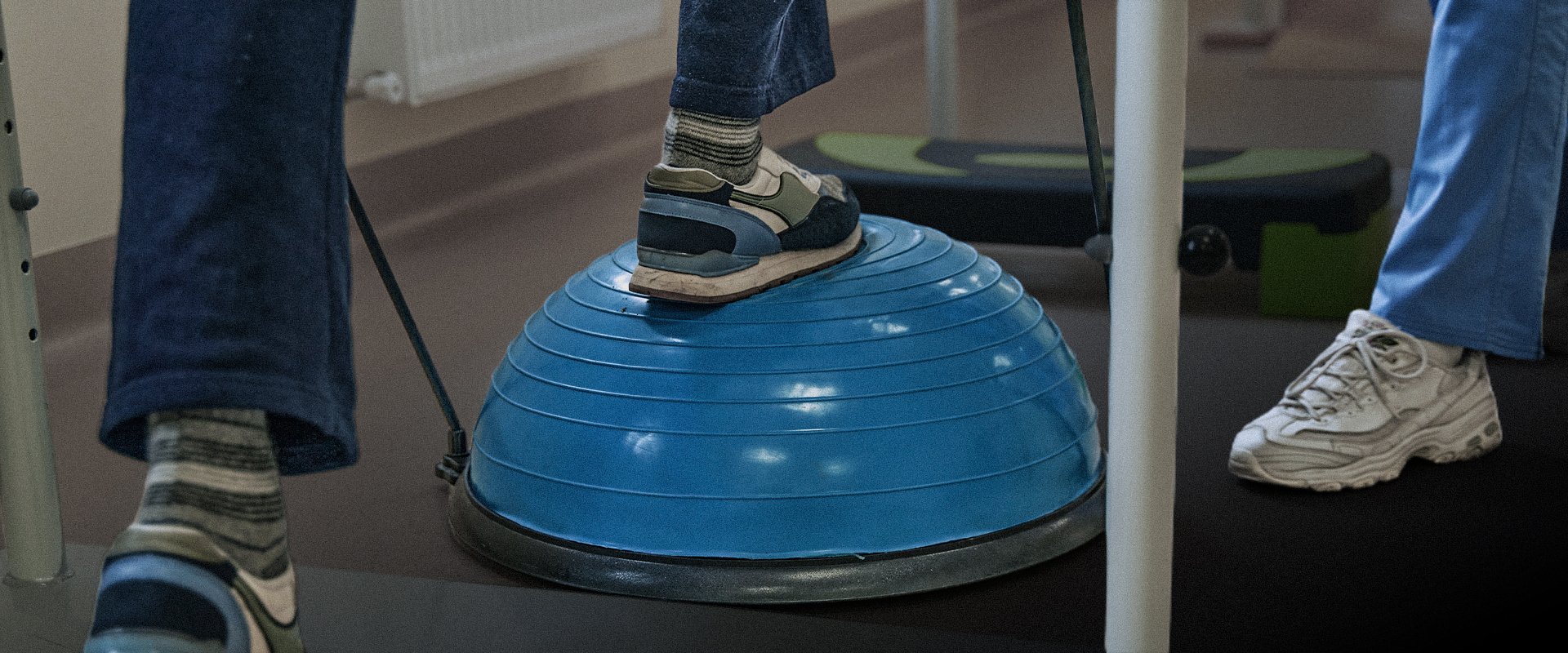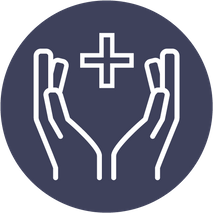
Physical Therapy for Neurological Therapy
AT EVOLVE
Physical Therapy for Neurological Therapy
HOW CAN PHYSICAL THERAPY BENEFIT THOSE WITH NEUROLOGIC DISEASES AND DISORDERS?
Whether new to the sport of football or a many-year veteran, most players are looking for both a competitive edge and a way to stay healthy across many seasons. As any successful player knows, success in football does not come in isolation but as a result of the support of many different people. When it comes to building this support network, a skilled physical therapist should make the roster. Not only are physical therapists experts in rehabilitation and recovery from injuries like those that can affect football players, they are masters of injury prevention and movement analysis, three qualities necessary for optimizing performance in a competitive sport like football.
WHAT DOES NEUROLOGIC PHYSICAL THERAPY LOOK LIKE?
Neurologic physical therapy, like all types of physical therapy, is individualized to each patient and their specific needs. Neurologic physical therapists use the latest evidenced-based practice techniques to address functional impairments as they relate to a variety of diseases and conditions affecting the neurologic system. In the first visit your physical therapist will perform an initial evaluation to better understand the pattern of symptoms you are experiencing as well as your goals and needs. We will ask you about activities within your life that are being impacted by these symptoms as well as about your health history including the type of neurologic condition you are experiencing.
We can then develop an individualized treatment plan based on your needs and the best evidenced-based techniques for the management of your condition. Your treatment program may involve hands-on manual therapy techniques performed by your therapist as well as movements and exercises performed by you in the clinic and at home. Your therapist will provide patient education and assist with the attainment of adaptive equipment when indicated as well as a host of other interventions.
WHAT CONDITIONS DO NEUROLOGIC PHYSICAL THERAPISTS TREAT?
While the list of neurologic conditions treated by physical therapists is long, below are many of the most common conditions addressed by neurologic physical therapy:
- Parkinson’s Disease
- Multiple Sclerosis
- Balance Disorders
- Vestibular conditions, vertigo and dizziness
- Concussion
- Traumatic brain injury
- Stroke
- Alzheimer’s and Dementia
- Peripheral Neuropathy
- Guillain-Barré
- CIDP
- Spinal cord injury
- Brain tumor
- POTS and other autonomic conditions
- Functional Neurologic Disorder
- Dystonia
- Gait disorders
- Cerebral palsy
- Muscle diseases and myopathies
WHAT SYMPTOMS ASSOCIATED WITH A NEUROLOGIC DISORDER OR DISEASE CAN PHYSICAL THERAPY HELP?
-
Physical therapy can help many of the signs and symptoms of neurologic disorders that impact an individual’s function. Depending on the type of neurologic disorder, disease or injury, the goal of physical therapy may be to help restore the function of nerves in the brain, spinal cord, trunk or limbs or it may be to help a person compensate for the loss of nerve function. If you are experiencing any of the following symptoms which are impacting your function, you may benefit from working with a physical therapist:
- Muscle weakness and loss of muscle endurance
- Pain
- Changes in sensation
- Changes in bowel and bladder control
- Clumsiness and loss of coordination
- Impaired balance
- Ataxia
- Foot drop
- Difficulty in walking
- Fatigue
- Dizziness or vertigo
- Muscle stiffness or spasticity
- Changes in gait
- Impaired aerobic endurance
- Difficulty with transfers or bed mobility
End Injury Progression
Physical therapy for Neurological conditions has proven to prevent injury, slow and even stop pain issues, improve performance, and slow condition progression in many cases.
Relieve Pain
The movements used in this technique can target your entire body helping you to manage discomfort and pain during the course of your physical therapy treatments.
Improve Range of Motion
Posture awareness is an important area to focus on due to the fact that certain positions may cause you further discomfort and pain.
Restore Mobility
You can regain mobility and flexibility by taking part in the stretches and exercises as prescribed by your physical therapist.
How Long Will Neurological Physical Therapy Last?
If you decide to work with a physical therapist to help with neurological related issues, your entire treatment plan could consist of around 8-20+ different physical therapy sessions that will each last 60-90 minutes. Once you complete your customized physical therapy treatment plan, you will be able to continue to do the prescribed stretches and exercises utilized during your PT sessions yet in the comfort of your own home.
PHYSICAL THERAPY INTERVENTIONS FOR NEUROLOGIC DISEASES AND CONDITIONS
As mentioned above there are many different conditions affecting the neurologic system and as such, there are evidenced-based treatment recommendations for each. Your physical therapist will individualize a treatment plan to meet your needs, however, these are some of the physical therapy interventions and services you may receive when working with your PT.
Patient education: your physical therapist will educate you about the condition that you have and how it may respond to physical therapy. Other topics for education like fall risk reduction, energy conservation and adaptive equipment are also discussed.
Gait and mobility training: physical therapists can assist in improving gait mechanics, walking endurance and recommend assistive devices for walking. For individuals using a wheelchair, physical therapists can help them obtain a wheelchair if necessary and train them how to use the device and perform safe transfers in and out.
Balance training: difficulty with balance is a common report amongst individuals with neurologic conditions. Physical therapy can assess the different balance systems and prescribe treatment to improve your balance and reduce your risk for falls.
Pelvic floor rehab: many individuals with neurologic diseases and conditions experience impairments in bowel, bladder and sexual function. A pelvic floor physical therapist can help with these concerns.
Strength and endurance training: strength training and endurance training to improve muscle performance in the arms, legs and trunk can help with performing daily tasks, participating in exercise and recreational activities.
Pain management: physical therapists can help with the management of musculoskeletal pain related to different neurologic conditions
Equipment prescription: different types of adaptive equipment and assistive devices can improve mobility, energy conservation and quality of life and your physical therapist can help guide you on which devices are most appropriate.
Aerobic training: Your physical therapist can help you participate in an aerobic exercise program safely.
Vestibular rehab: for those experiencing dizziness, vertigo, disequilibrium or balance challenges, vestibular rehabilitation can help address underlying causes and reduce symptoms.
Living with a neurologic disease or condition takes a team approach and physical therapy is a great tool to help manage symptoms and improve function and quality of life. If you are ready to learn more about how physical therapy can help you, call Evolve today to schedule your initial evaluation.
Mill Basin (located in Harbor Fitness)
6161 Strickland Ave
Brooklyn, NY 11234
Monday: 7am-8pm
Tuesday: 7am-8pm
Wednesday: 8am-5pm
Thursday: 7am-8pm
Friday: 8am-1pm
Park Slope (located in Harbor Fitness)
550 5th Ave.
Brooklyn, NY 11215
Monday: 9am-8pm
Tuesday: 8am-6pm
Wednesday: 9am-8pm
Thursday: 8am-6pm
Friday: 8am-3pm
Gravesend
372 Avenue U
Brooklyn, NY 11223
Monday-Thursday: 8am-8pm
Friday: 8am-3pm
Ready to take the next step to a healthier you?
Contact Us Today!
PHYSICAL THERAPY FOR NEUROLOGIC THERAPY!
Need physical therapy for Neurological Therapy?
Let our caring and compassionate physical therapists help you with relieving pain while getting you back on your feet comfortably.
Call now to schedule your first PT consultation free of charge.
Call: 1-718-258-3300







